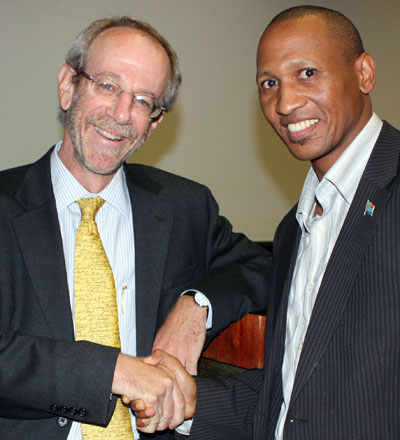Latest News Archive
Please select Category, Year, and then Month to display items
22 May 2020
|
Story Nitha Ramnath
![]()
A Virtual celebration of Africa Month
On 25 May 2020, Africa will celebrate the 57th anniversary of the founding of the Organisation of African Unity. A central tenet of the organisation, which was the predecessor of the African Union, is African solidarity. Member states undertook to coordinate and intensify their cooperation and efforts to achieve a better life for the people of Africa. The University of the Free State (UFS) has a long tradition of commemorating Africa Day and the ideas underpinning it. Every year, diverse events aimed at advancing African unity and solidarity take place during Africa Month – traditionally, the highlight is the Africa Day Memorial Lecture hosted by the University's Centre for Gender and Africa Studies.
This year, celebrating African unity through significant events involving the physical presence of a large number of people, will likely be impossible. COVID-19 is ravaging the world and Africa may become one of the world regions worst affected by the consequences of the virus. Social distancing may be difficult to achieve in a continent with densely populated urban centres that often feature large informal settlements. Besides, the economies of African nations are not as robust as those of other world regions. The challenge that Africa is facing, appears to be one that can only be mastered by its people acting in solidarity and unity. The continent has already developed an Africa Joint Continental Strategy for COVID-19 Outbreak to combat the virus, and an Africa Taskforce for Coronavirus has been established. The ideas of African togetherness and the underpinning philosophy of Ubuntu may be critical for strengthening African solidarity at a time when it may be more relevant than ever.
The commemoration of Africa Day takes a different theme each year. This year, the UFS 2020 Africa Month celebrations will take a virtual format, with the theme of ‘Africa together forever’ underpinned by the COVID-19 global pandemic. The theme is particularly significant considering the context of the African continent; and only through the demonstration of solidarity and unity can Africa overcome the challenges of the global pandemic.
The University will host a variety of cultural and intellectual contributions on the dedicated UFS virtual Africa Month website. On Africa Day (25 May 2020), a virtual Africa Day function, which will be posted on the website, will conclude the Africa Month commemorations.
The diverse contributions to the 2020 virtual Africa Month activities will highlight the University’s commitment towards creating a diverse, challenging intellectual environment. The UFS strives as a research-led university, to provide an environment in which new ideas are incubated and debated; contributing towards its transformation process and African unity.
US Consul-General speaks at the UFS
2010-09-23
 |
|
Mr Andy Passen, US Consul-General, and Mr Arthur Johnson from the Internationalisation Office at the UFS.
Photo: Leonie Bolleurs
|
The Consul-General of the United States of America, Mr Andy Passen, recently presented a public lecture at the University of the Free State (UFS). He focused on the importance of youth development in the current dispensation and introduced President Barack Obama's Young African Leaders Forum. In his presentation he pressed upon the young leaders that they possessed both the privilege and responsibility to shape the future of Africa for the next 50 years.
He also engaged the UFS as a potential host of the Brown vs Board of Education exhibition, namely Separate is not equal. The exhibition is hosted annually at various cities and higher education institutions in South Africa. The multimedia exhibition uses films, photographs, sound recordings and reconstructions to tell the history of segregation in the USA, the landmark supreme court ruling in Brown vs. Board of Education on 17 May 1954, and the subsequent decades of struggle for racial equality. The exhibition also highlights parallels to the South African experience.